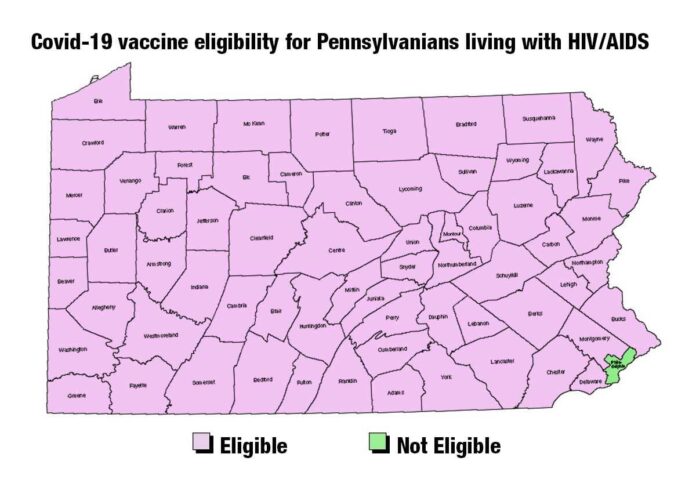
(NOTE: One day after this editorial was published, the city of Philadelphia added people living with HIV to the group currently eligible to receive the COVID-19 vaccine. Read our update here.)
Tim Cwiek’s cover story in this week’s PGN, about a Philadelphia man with AIDS who was turned away for a COVID-19 vaccine, speaks to several issues happening right now in the city, state, and country as a whole.
First, let us say this: people with HIV/AIDS should be included with those currently eligible to receive vaccinations in Philadelphia, group 1B. This group includes people with health conditions such as cancer, chronic kidney disease, pregnancy, heart conditions, and obesity. To say that people living with HIV/AIDS are somehow less susceptible to COVID-19 complications, even if they are receiving treatment and have an undetectable viral load, is nonsense.
As Dr. Mark Watkins and Jane Schull both indicate in Cwiek’s article, even if a person is currently receiving treatment for HIV/AIDS, if their CD4 cell count ever dipped below 200, they are vulnerable to complications from COVID-19.
HIV attacks CD4 cells (white blood cells that fight infection). With treatment, a person’s CD4 cell count can increase. However, as both Watkins and Schull expressed, if a person at any point had a CD4 cell count below 200, even if their current cell count is higher, they are still susceptible to COVID-19 complications.
As of the writing of this editorial, Philadelphians with HIV/AIDS are not eligible to receive the COVID-19 vaccine as part of group 1B.
This is different from the rest of the commonwealth of Pennsylvania, which placed people with HIV/AIDS in group 1A. The reason is that Philadelphia has its own set of vaccine guidelines separate from the rest of the state.
Philadelphia is currently following CDC guidance in not placing HIV/AIDS in the list of health conditions for group 1B. However, in this case, an exception should be made. The CDC does not know the population of Philadelphia as well as the city health department, at least they shouldn’t. Around 19,000 Philadelphians are living with HIV/AIDS. However, not all of those people are receiving treatment. In 2019, for example, 81% of people newly diagnosed with HIV were linked to care within one month of diagnosis. However, retention in care is even lower than that.
The commonwealth of Pennsylvania made people with HIV/AIDS eligible for COVID-19 vaccination, but the city of Philadelphia did not. The city’s reasoning, that they were following CDC guidelines, is not good enough anymore. The CDC is not perfect. Sometimes their guidance needs to be adapted depending on the population. In Philadelphia’s case, that time for adapting is now.
If the city of Philadelphia wants to set its own rules when it comes to vaccine distribution, it should do so with the consideration of all of its citizens. Unfortunately, on the issue of HIV/AIDS and COVID-19 vaccination, the city has fallen behind the commonwealth.
